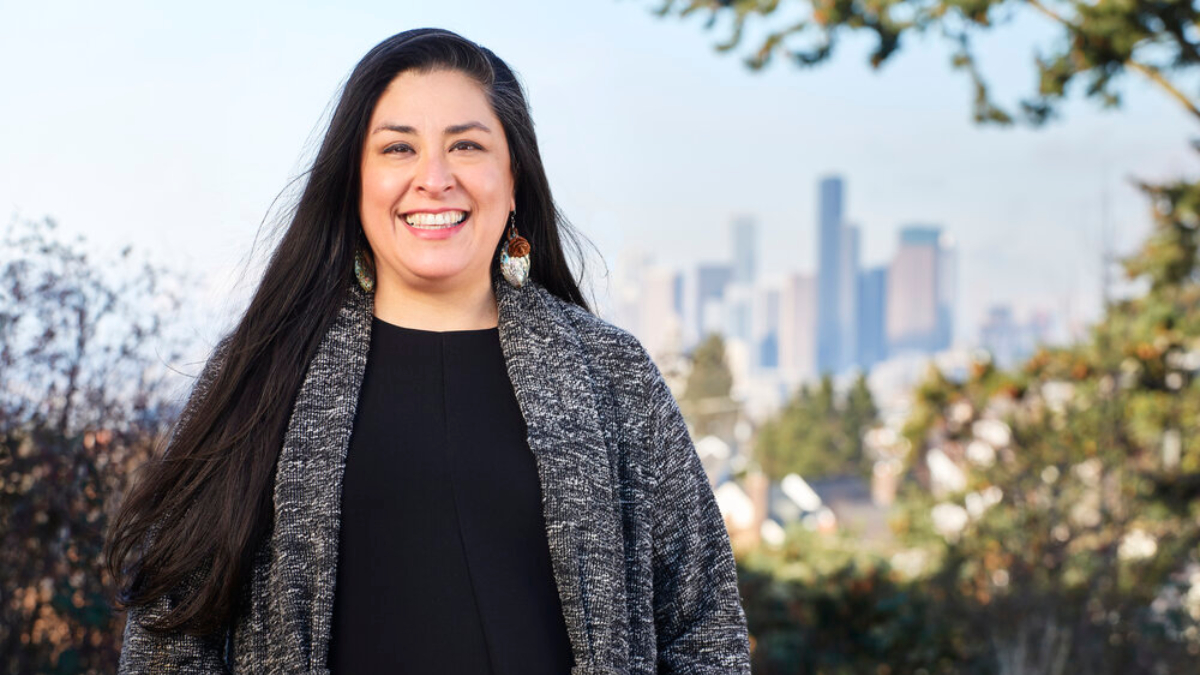Local
Seattle mayoral candidate Colleen Echohawk discusses her platform and vision for the city
The 2021 mayoral candidate shares her vision and goals for Seattle.

[SEATTLE] – (MTN) Malcontent News is conducting a series of interviews with 2021 Seattle mayoral candidates. We have contacted, or are in the process of contacting the most viable candidates, inviting them to answer seven prepared questions. Today we feature Colleen Echohawk.
For all candidates, the first interview will be about their platform and vision. Prior to the primary election, we will conduct a second round that will focus on differentiation, and challenging positions and visions. Once the final candidates are selected in the primary, we will invite them for one last round of interviews.
All candidates for the first round will be asked the same seven questions, and have received a copy in advance. These questions were created by our editorial board, and are aligned to topics of key interest to the residents of Seattle.
Malcontent News is committed to providing equal time for all candidates, and operating under a “fairness doctrine” of equal time and treatment for all candidates.
We will be publishing a transcript of each interview. Transcripts may be lightly edited to remove, umms, ahhs, pauses, and aid in readability.
COLLEEN ECHOHAWK
Jennifer Smith:
Hello, Malcontents! This is Jennifer and I’m here today with Seattle mayoral candidate, Colleen Echohawk. How are you doing today, Colleen?
Colleen Echohawk:
I’m doing great. Thank you so much for having me. I’m really excited to be with you.
Jennifer Smith:
We’re really excited to have you here. So just to kind of start off, what inspired you to run for mayor?
Colleen Echohawk:
Well, thank you so much for asking. This is a beautiful, wonderful city. I have lived here now for over 20 years and I care deeply about our community. And I have seen, along with all of us who live here, the tremendous frustration around some policies that are just not working for our city, specifically, homelessness. I have been working in homelessness now for over seven years. I believe deeply in our homeless community. I believe that they can get to wellness and stability and housing, but we have not set up the structures that will help them get to that place of wellness. As the pandemic came crashing down on us, I saw our homeless community really suffering. And then I also saw that our city was not responding in a way that serves them well and serves the rest of our community.
I think those of us who live in the city, it’s so frustrating for us because we, we cared deeply about, our community, including our homeless community. But when we see that we’re not getting anywhere, it is incredibly frustrating. So, that was one of the big reasons. The other thing is COVID-19. I [have] served our homeless community and our native community for a very long time now. I know very, very well that we have some incredible disparity, some health outcomes around COVID-19 that were really hard to hear and see, in the native community, we were, 1.8 times more likely to die of COVID, more likely to be hospitalized because of COVID. And those kinds of numbers were already there before the pandemic. And then as I thought about what would happen after I realized we need leadership that understands equity, that understands racial justice so that we can come out of this pandemic stronger, that we can address these inequities and be the kind of city that we say we are. We are a progressive, compassionate, generous city. And I look forward to the opportunity to lead with a lens of equity and justice.
Question one – houselessness crisis
Jennifer Smith:
Well, thank you very much for that. And I think this is an excellent segue into our first question. So Seattle is facing an ongoing crisis related to unhomed peoples. Washington state experience to 6.2% increase in homelessness during 2019/2020. King County spends over $1 billion per year in public and private investment in support of approximately 12,500 houseless people with disappointing results. If you are elected mayor of Seattle, how would you address this crisis? And also as co-founder of the Coalition to End Urban Indigenous Homelessness, which aids unhomed urban indigenous people, can you speak to the unique challenges indigenous people living in urban spaces like Seattle face.
Colleen Echohawk:
Thank you so much for the question. And one thing we know about our homeless community here in Seattle and around the country actually is that people of color are way overrepresented in the community and the homeless community. So for instance, native people make up less than 1% of the population, but in our homeless population, we make up 15%. So an incredible disparity, that’s about a thousand to 1100 people, who are of native people who are experiencing homelessness on the streets of Seattle. And then you think about, the city we are named after a chief, we are a Coast Salish city at the heart of who we are, who we are as a community. And so, it truly is unbelievable that we have such high rates of native people experiencing homelessness and even more unbelievable than that in a city like Seattle, that’s very prosperous, innovative, and entrepreneurial.
We have so many of our community experiencing homelessness around 12,000 folks are experiencing homelessness. And about [3,000] to 4,000 of those are people who been asleep outside at night, every, every single night, it’s, it’s truly horrific. In my opinion, it is a humanitarian crisis and we have to do more. And as mayor of the city, I have a unique lens of actually being a homelessness provider and also a builder of affordable housing. So I know, that we’re going to have to take many approaches. There’s no one solution to solving homelessness in our city. It’ll take many approaches, excuse me, the moment I am elected, I will be jumping into finding solutions that are going to be kind of the all of the above approach. We need more tiny houses. We’re going to need more hoteling. We’re going to need safe, lots for RVs and other vehicles.
There will be a variety of different things for people to choose. We also need culturally appropriate case management and services. When we think about the native community, many of our native folks, because of the fear of government institutions, which we get, we come to legally, we have not found many solutions in the mainstream organizations. So I would be thinking about and supporting and innovating around Black-led services and native-led services so that we find cultural approaches that would serve our homeless community. And I believe that’s one of the reasons we have such high rates of native homelessness is that we haven’t had those culturally specific programs, the same for the black community and the refugee community who are experiencing homelessness. I think that this is an exciting opportunity for our city.
We have the American relief program coming in. We have FEMA dollars that we can use. We have other federal, we have a friend in the White House who believes so much in taking care of this issue, that’s not just here in Seattle, but around the country. I have worked on the national level. I founded the National Coalition on Urban Indigenous Homelessness. I am a new board member at the National Low Income Housing Coalition. So I understand what it will take because that’s the final part is we have to build enough. I would say to anyone who lives in Seattle, like let’s put our frustrations behind this and let’s join a campaign together to serve our homeless community and get them out of our parks and out of our, right-of-ways. Our homeless community is not a place that they can thrive there. They need to thrive in housing. And then we all can use our parks and use our greenways. And, it’s gotten really out of control and we have to have leadership that will, understands the issue and knows how to solve it. And I’m that leader.
Question two – infrastructure and economic recovery
Jennifer Smith:
As a result of the ongoing COVID pandemic, economic recovery development, as well as addressing Seattle’s crumbling transit infrastructures, such as the West Seattle bridge is of great importance to me, moreover, some are expressing concern about large corporations and many in the workforce meeting in Seattle. The question is threefold, how do you plan on tackling the infrastructure issue, aiding and economic recovery and development as we move beyond COVID. And what concerns do you have about the loss of corporations and workers?
Colleen Echohawk:
We know that in our city, we have some pretty severe issues around infrastructure. We have the West Seattle bridge, the Magnolia bridge that needs to be replaced. We have streets that need to be supported. We have garbage on our streets that, I think it’s unacceptable. I think we should not have that in our city. And as, an executive director of a pretty large nonprofit, I understand the role of the mayor as being the executive to care for our city to care for our whole city. I have a lot of experience in homelessness, but I also have experience in management and taking care of our community. And I look forward to putting those skills into place because we need to have shovel-ready projects.
Like I mentioned earlier, we now have a friend in the White House. We have President [Joe] Biden. When he comes out with infrastructure packages, which is, happening right now, we need to be ready. We need to go. I would work really closely with Patty Murray. She’s the number two Democrat on the Senate Appropriation Committee. I would work very closely with her and let her know what our needs are in Seattle. Also, Senator Cantwell, she chairs the Senate Committee on Commerce, Science, and Transportation. We are so lucky to have their leadership, and I would just be excited to talk with them and, and share with them about what the opportunities are here in Seattle and what we absolutely need. I have a lot of experience in going after the dollars that we need to be able to take care of our community. We also know that Governor Inslee has an infrastructure plan and I would be active in reaching out to him and ensuring that we get our needs met here.
Jennifer Smith:
The second part of the question deals with aiding and economic recovery and development as we move forward.
Colleen Echohawk:
We have a real reality ahead of us that it’s going to take some time to recover from COVID. And we nailed that. Our economy needs to recover and our community needs to recover in many ways. We need an opportunity to heal, and we also need people who are going to jump in and get to work immediately. About nine months ago, I started to really understand that, we can’t just be focused on economic recovery. We have to be thinking about an equitable recovery because when our economy is equitable, then we are truly going to be able to support the whole community. So I co-founded the Equitable Recovery and Reconciliation Alliance. The idea behind ERA is that the BIPOC community, the Black indigenous, and people of color community, we have a policy-driven solution that needs to be implemented.
But we often don’t have the voice that we need to have. And then, my co-founder, his name is Ben Franz-Knight, and he is the previous executive director at Pike Place Market. His role is to help our community who is really working to understand what it means to be equitable in our recovery. His role is to help them come together. So we’re looking and working with things like the downtown Seattle Association, Greater Seattle Business Partners, and the Chamber of Commerce to think about what it means to support BIPOC led solutions. And so this is, again an opportunity. This is a once-in-a-generation chance to do the right thing. so I look forward to doing this in partnership with [the] community. And I do also hope that our corporations come back into downtown Seattle and see this place as an opportunity to continue our legacy of innovation, to continue our legacy of entrepreneurship in this region. And I will be there to support them and to ensure that when we see corporations and businesses coming back into our city, that we see it with a lens of equity and racial justice. It’s really an excellent and exciting opportunity.
Question three – does Seattle have a crime and/or inequity problem
Jennifer Smith:
Moving on to the topic of equity and racial justice. Protests related to the murder and George Floyd, police violence, and ongoing racial inequality. Seattle has earned a national reputation as crime-ridden, dirty and unsafe. At one point the previous Presidential administration labeled Seattle an anarchist jurisdiction. Are you concerned about this narrow view of Seattle? If so, what will you do to shift this perception and how will you address the ongoing racial inequality that exists?
Colleen Echohawk:
I don’t know about [you], but I had people calling me from around the country, friends, and relatives saying, “What’s going on in Seattle? It’s like an anarchist takeover is happening. and everything is burning,” and as you know, that is not true.
I think that we really do need to be thinking about changing the narrative around Seattle. If I was elected mayor, I would see myself as an ambassador to the rest of the state and the country and the world to say, this is what Seattle is about. This is a community of amazing, progressive, generous, compassionate, entrepreneurial community. And we warmly welcome you to our city. I think that there is [an] amazing opportunity around tourism. I hope that our Black and indigenous and people of color-led organizations see this opportunity to think about ways that we can support the tourism industry and incubate business that maybe hasn’t happened before.
I think that we absolutely want to change this weird narrative that’s happened around Seattle and show who we really are. I’ve also talked to people in the suburbs of Seattle and they say things like, “Oh, Seattle, traffic’s too bad.” This kind of complaining about Seattle. I want to change that narrative too.
I want people to remember that we have the Kracken and we have the Mariners and the Seahawks. We have a thriving nightlife and restaurants that people want to come to. And let’s make this a great place for people to celebrate big celebrations. They come to sporting events and to be coming to our wonderful arenas. I just think it’s a really cool opportunity that I look forward to jumping into. No one loves the city more than I do. My sister, when I was thinking about running for mayor, and I also had an opportunity out in Washington, DC, she [said], “Colleen, you love Seattle. Why would you go to Washington DC?”
You’re totally right. I love this place. I’m just going to do the best I can to lift it up and celebrate the city and let the world know what a great community we truly are.
Question four – police reform
Jennifer Smith:
In addressing the racial inequality piece. How would you work to kind of move beyond that and think more critically about, solutions for the ongoing racial inequality that exists within Seattle?
Colleen Echohawk:
We have some significant issues in our city around this. We are a progressive city, but we don’t always live out our progressive values. And I hope to really inspire, encourage, and envision with everyone about what that could really look like. I can give you an example. We struggle right now with housing for our Black community. Our Black community has been pushed out of the Central District and we also know that essential workers can’t afford to live here. And a lot of them are people of color. If we believe that Black lives matter, we believe in our progressive values that means we believe in housing for them. That means we believe in the incubation of small businesses that are owned by Black, Indigenous, and people of color communities. And so I hope to truly help our communities, our neighbors understand that value and understand that when, when we do practice equity and racial justice, that it’s good for our whole community. It’s not just good for the Black and indigenous people of color communities. It’s good for everyone. And that’s going to be exciting for us as a community.
Jennifer Smith:
So when we look to the West coast cities of Portland, San Francisco, San Jose, Sacramento, and San Diego. Seattle has the second-highest cost per police officer tied with Oakland and the second-highest officer per capita behind San Francisco. Additionally, the average officer makes $153,000 a year before benefits, according to the Seattle Times. Despite this large force and supporting budget, Seattle police report slow response times and claim the issue is a lack of staffing. The budget was cut by approximately 18% and staffing levels were adjusted to support roughly 1,325 officers. How would you define defund, the police? What is your position and how would you go about restoring community, particularly BIPOC community trust in the Seattle police department?
Colleen Echohawk:
This is something that is of grave concern for me. I got my start in working in the police reform arena. After the murder of John T. Williams, it’s still jarring. It’s still kind of just unbelievable native people have the highest rates of being shot by police around the country. And we’re a very small part of the population we have to do better. And, as I look at our whole city, we need to make sure that our police department is accountable and transparent. We need a reset of the police department from top to bottom, and I’m always open to looking at our pay structure – absolutely, I also believe that part of the mayor’s job is to find an excellent chief of police and hold that chief of police accountable for our police officers that are out there.
I’ve also been on the Community Police Commission and I know the issues really well. I mean our reform, since again, the murder of John T. Williams and the consent decree, it’s, it’s been, a decent start, but it’s also failed us as we saw over the summer. We have a real problem when we see officers hiding their badges during protests, we still see incredible racial disparity in arrest. And this is one of my top priorities if I’m elected. We will find a chief of police to hold our Seattle police department accountable. The issues of racial disparity in our police department. We do absolutely have to think of a cultural shift in that department and that starts straight from the chief all the way down to every single police, to someone out there on the beat. There is an accountability that absolutely has to happen from the community. And I look forward to continuing to evaluate our reform system as is.
I think that there is a lot of room for us to strengthen it. And I would look forward to hearing from the community about community-led solutions that will ensure that we have a police department that is not just, they’re not warriors, but they are guardians. So they are there to support the community in times of incredible significant need. Until we get there, we have to have a mayor that will hold them accountable. I can tell you that that is a passion of mine, something I look forward to doing, and if elected, that would be one of my top priorities
Question five – mental health crisis
Jennifer Smith:
On the topic of police, accountability, and reform. One of the many things COVID has shed light on is the ongoing mental health crisis in the country. Seattle is not exempt from this. Recently a man in the throes of a mental health crisis was fatally wounded by [Seattle police] near the Seattle waterfront. Would you consider implementing something similar to the STAR program in Colorado, which replaces traditional law enforcement responders with a medic and mental health professional for some emergency calls as a way to deescalate situations where there’s a clear mental health component?
Colleen Echohawk:
Absolutely. I support finding new ways to support folks who are experiencing mental health crises. I can tell you from personal experience, working with someone in our homelessness community that pulled a knife, in the day center of the Seattle Club, and I saw a social worker deescalate the situation in less than a minute. So it was heartbreaking, cause I’ve seen this with my own eyes, it was incredibly heartbreaking for me. When I saw [a] son, uncle nephew down there on Alaska Way with a knife who was many feet away from these officers, and then he was shot and killed. That was heartbreaking for me. And those are the kinds of things that should be taken out of the hands of our Seattle police department. I absolutely support community innovation around new ways to support mental health in our system. And I’ll also say that we have to get to the Washington state legislature as well.
We know that Washington state is vastly behind in supporting mental health in our system. I think that as we work so hard to support our homeless community, it hit me [as] absolutely heartbreaking when you see someone who needs that support and we have nowhere to send him, we have to fix that and that. It’s going to take courageous leadership, it’s going to take decisive leadership and it’s going to take innovation. And I believe I’m the right leader for those kinds of issues going on in our communities.
Question six – zoning and Seattle housing crunch
Jennifer Smith:
You talked a little bit earlier about the necessity of affordable housing. Eighty-eight percent of Seattle’s land that is zoned for housing is zoned for single-family housing. Over the five years, most of the new construction centered on the 12% that supports highly dense housing, Developers focused on small footprint properties with minimal parking and luxury appointments. Housing affordability is a major problem for Seattle as you’ve noted already. Do you support changing zoning rules for ADUs and more dense construction to alleviate the housing crisis, and what changes would you support?
Colleen Echohawk:
Absolutely. We have a lot of competing challenges before us like we haven’t really talked yet about the climate crisis, but there are intersections there. A housing affordability emergency is upon us right now. And we need to be thoughtful and creative about creating more density in our city, creating opportunities, for more housing that really truly works for our community. I absolutely believe in transit-oriented development. I think that our backyard cottages are amazing. And then I think we need to think about how we build affordable housing, that that truly does not encourage gentrification, but encourages, our Black, indigenous, and people of color communities to come back into Seattle. I have worked on the community preference policy. I think that that is a really excellent way to get started. And I think that there is just tremendous opportunity around affirmative marketing for some of our affordable housing that’s being built. We have to change our zoning laws if we’re going to truly address our climate crisis and our housing affordability.
Question seven – taxation
Jennifer Smith:
Seattle has a reputation for having high taxes compared to other Washington cities. A number of initiatives have added incremental taxes to fund transit, homeless programs, education, and the general fund. These taxes are small on paper, one 10th of a percent, for example, but most of these taxes are regressive due to Washington state’s tax structure. Will you pledge no new taxes for Seattle?
Colleen Echohawk:
I take a people-first approach on this, and I think that we absolutely need to understand the impact of a sales tax on our community. And it is not fair. It is not just, and we need to do better. Now, we have certain legal issues around an income tax, and we need to find new ways to generate revenue. So I would not say no, I will not incur any new taxes, but I think I want to incur the right kind of taxes, the taxes that are fair. I think a capital gains tax is really interesting and something that I would absolutely explore, but I believe that we in this city understand our responsibility to our homeless community, to [a] community that is hurting and suffering. In a city like Seattle, we should not have the amounts of poverty that we have in some of our communities. We should not have health inequities that we have, and that’s going to take some money and we need to that. And I look forward to working with [the] community about the kind of investments that we want to make.
Additional Questions
Jennifer Smith:
Indigenous peoples are leading the efforts to bring about many meaningful changes globally, nationally, and locally. If elected, you would be the first indigenous mayor of Seattle since the office’s inception in 1869, something that is long overdue. Can you speak to the significance of what being elected mayor of Seattle will mean both to you personally and what it potentially signifies for native nations and communities more broadly?
Colleen Echohawk:
I started thinking about running for mayor because I care about the city and I care about our homeless community, and I know I have the right kind of solutions. Being an indigenous mayor kind of just was part of like, who I am. And as I started thinking about it and understanding it more, it’s become more important. I have two amazing, beautiful children, and I want them to understand and know that it’s normal for a native woman to be the mayor of a city, because I didn’t have that growing up. when Sharice Davids and Deb Haaland were elected into Congress, I have goosebumps thinking about it now. Like it just was so unbelievable to me, people who I know understand where I come from, to have that kind of representation? It matters.
Before I announced, I talked to, leaders of the Coast Salish communities because I’m in their land right now. I am not Coast Salish, I’m Pawnee. Then I also talked to some of my elders, and one elder said to me, “Colleen, you need to remember that in our language leader means servant. And you need to remember that as you are trying out this new thing, that you are a servant to this community.” I take [it] seriously, I take that soberly, that if elected mayor that I would be a servant to this community. I would lead from a place of humility and, a place of understanding the issues that are in this community. That I have the right kind of solutions and [these] are different solutions. I think it’s time for new ideas and new people. To be in elected office, it’s exciting, and I take it seriously. I hope I win! I [hope] I’m that first person.
David Obelcz contributed to this story.










